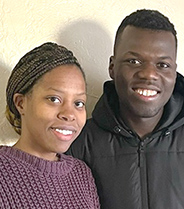By Tara Huff, The Eagle Press
Kimberly Snelgrooes, Jared Snelgrooes, Sherlie Joseph, and Kevenson Jean sat around the Snelgrooes kitchen table, each trying to process the looming uncertainty of Sherlie and Kevenson’s future. Sherlie and Kevenson’s lives have been built on a foundation of hope, hard work, and the promise of a better life in the United States. But with the arrival of a letter from Homeland Security, the rug was pulled out from beneath them. They now face an impossible choice: remain in the United States and risk being separated from the life they had built, or return to Haiti, where danger and uncertainty awaits.
Kevenson and his wife Sherlie came to the United States under the CHNV humanitarian parole program, a lifeline offered to people from Haiti, Cuba, Nicaragua, and Venezuela. For the past year and a half, they have worked tirelessly, each holding down two jobs, hoping to one day secure a better future. Kevenson graduated with his CDL from Clarendon College. Since receiving their work permits, Kevenson and Sherlie have paid US Social Security, Medicare, and federal income taxes. They will never be eligible for the benefits they are contributing to.
Kevenson, along with his two jobs, has gone to school and is now a truck driver. His goal is to go back to school for business administration. Sherlie continues to work hard and wants to attend Frank Phillips College to earn a nursing degree. They have their own housing and live modestly without relying on government assistance. It is a life they have worked hard to create, but now that life is on the brink of falling apart.

Eagle Press Photo
The news hit them hard. The CHNV parole program was being terminated. The Department of Homeland Security had announced that the program would come to an end, effective immediately, forcing those who had entered under the program to leave the United States or face deportation. United States Secretary of Homeland Security Kristi Noem is quoted to say she has found the program no longer “serve a significant public benefit, are not necessary to reduce levels of illegal immigration, … and are inconsistent with the Administration’s foreign policy goals.”
Kimberly has spent countless hours navigating the complex bureaucracy to help Kevenson and his family come to the United States. She said that now, the very country they had come to for safety and opportunity was telling them to leave.
“What are we going to do?” Kevenson asked, his voice tinged with disbelief. Two tickets alone will cost approximately $5,000, money this modest family does not have.
The idea of returning to Haiti was a terrifying prospect. Port-au-Prince, the capital, is under gang control. The airport there is closed, and even if they could fly into a different part of the country, they would have nowhere to go. The roads to their families’ homes are also under gang control, leaving them trapped with no safe place to seek refuge.
Sherlie’s voice broke the silence. “If we go back to Haiti, it’s like we’re being sent to die. Port-au-Prince is a war zone, and the rest of the country isn’t much better. I can’t even get to my mom’s house. The roads are controlled by the gangs. They’ll take us, and there’s nothing we can do.”
When asked what they would do after they arrived and how would they survive, Kevenson’s answer was bleak.
Kevenson shook his head. “You get off the plane, and you just don’t know what happens next. You turn left or right and hope for the best. But it’s not safe. We’ll be targets, easy prey. We’ve been to America. We’re marked now.”
None of them had prepared for this reality. They had worked hard to create a life in the United States, and now, it seems as though they have no choice but to go back to a country on the brink of collapse. The fear of what will happen when they get off the plane in Haiti is overwhelming.
Kimberly said, “The government is saying they don’t belong here anymore, but they have followed every rule. They have done everything right. They deserve to stay.”
“We can’t just give up,” Kimberly said, her voice steady but filled with resolve. “We’ll fight this for you, for your family, for everyone who’s in the same situation. We have to try.”
Kimberly pleaded, “We all heard the soundbites about illegal criminals infiltrating our country and how the next four years would be spent expelling them from our communities. But Kevenson and Sherlie are not criminals. They are not a drain on our community. So why are they being targeted? Please contact your U.S. congressional and senate representatives today. Call them, email them, write to them. In the Texas Panhandle, our congressman is Ronny Jackson, and our Senators are Ted Cruz and John Cornyn. Contact them today.”
Tara Huff is the Publisher and Editor of The Eagle Press, covering Fritch and all of Hutchinson County.


Leave a Reply
You must be logged in to post a comment.